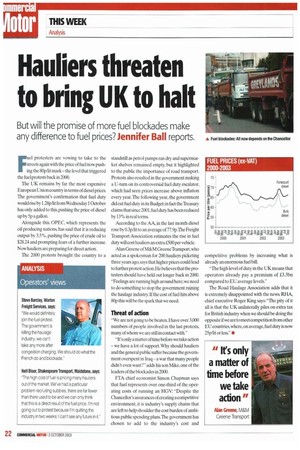Hauliers threaten to bring UK to halt
Page 22

If you've noticed an error in this article please click here to report it so we can fix it.
But will the promise of more fuel blockades make any difference to fuel prices? Jennifer Ball reports.
Fiel protesters are vowing to take to the streets again with the price of fuel now pushng the 80p/lit markthe level that triggered the fuel protests back in 2000.
The UK remains by far the most expensive European Union country in terms of diesel prices. The government's confirmation that fuel duty would rise by 1.28p/1i1 from Wednesday 1 October has only added to this, pushing the price of diesel up by 5p a gallon.
Alongside this, OPEC. which represents the oil producing nations, has said that it is reducing output by 3.5%, pushing the price of crude oil to $28.24 and prompting fears of a further increase. Now hauliers are preparing for direct action.
The 2000 protests brought the country to a standstill as petrol pumps ran dry and supermarket shelves remained empty, but it highlighted to the public the importance of road transport. Protests also resulted in the government making a U-turn on its controversial fuel duty escalator, which had seen prices increase above inflation every year. The following year, the government did cut fuel duty in its Budget: in fact the Treasury claims that since 2001 ,fuel duty has been reduced by 13% in real tenns, According to the AA, in the last month diesel rose by 03p/lit to an average of 77.9p.The Freight Transport Association estimates the rise in fuel duty will cost hauliers an extra E500 per vehicle.
Alan Greene of M&M Gre ene Transport, who acted as a spokesman for 200 hauliers picketing three years ago. says that higher prices could lead to further protest action. He believes that the protesters should have held out longer back in 2000. "Feelings are running high around here; we need to do something to stop the government ruining the haulage industry. If the cost of fuel hits above 80p this will be the spark that we need.
Threat of action
"We are not going to be beaten.1 have over 3,000 numbers of people involved in the last protests, many of whom we are still in contact with."
"It's only a matter of time before we take action we have a lot of support. Why should hauliers and the general public suffer because the government overspent in Iraq a war that many people didn't even want?" adds his son Mike. one of the leaders of the blockades in 2000.
FTA chief economist Simon Chapman says that fuel represents over one-third of the operating costs of running an HGV: "Despite the Chancellor's assurances of creating a competitive environment, it is industry's supply chains that are left to help shoulder the cost burden of ambitious public spending plans. The government has chosen to add to the industry's cost and competitive problems by increasing what is already an enormous fuel bill.
"The high level of duty in the UK means that operators already pay a premium of £3.3bn compared to EU average levels," The Road Haulage Association adds that it is extremely disappointed with the news. RHA, chief executive Roger King says: "The pity of it all is that the UK unilaterally piles on extra tax for British industry when we should be doing the opposite if we are to meet competitionfrom other EU countries.where, on average, fuel duty is now 25p/lit or less.




























































































































































































